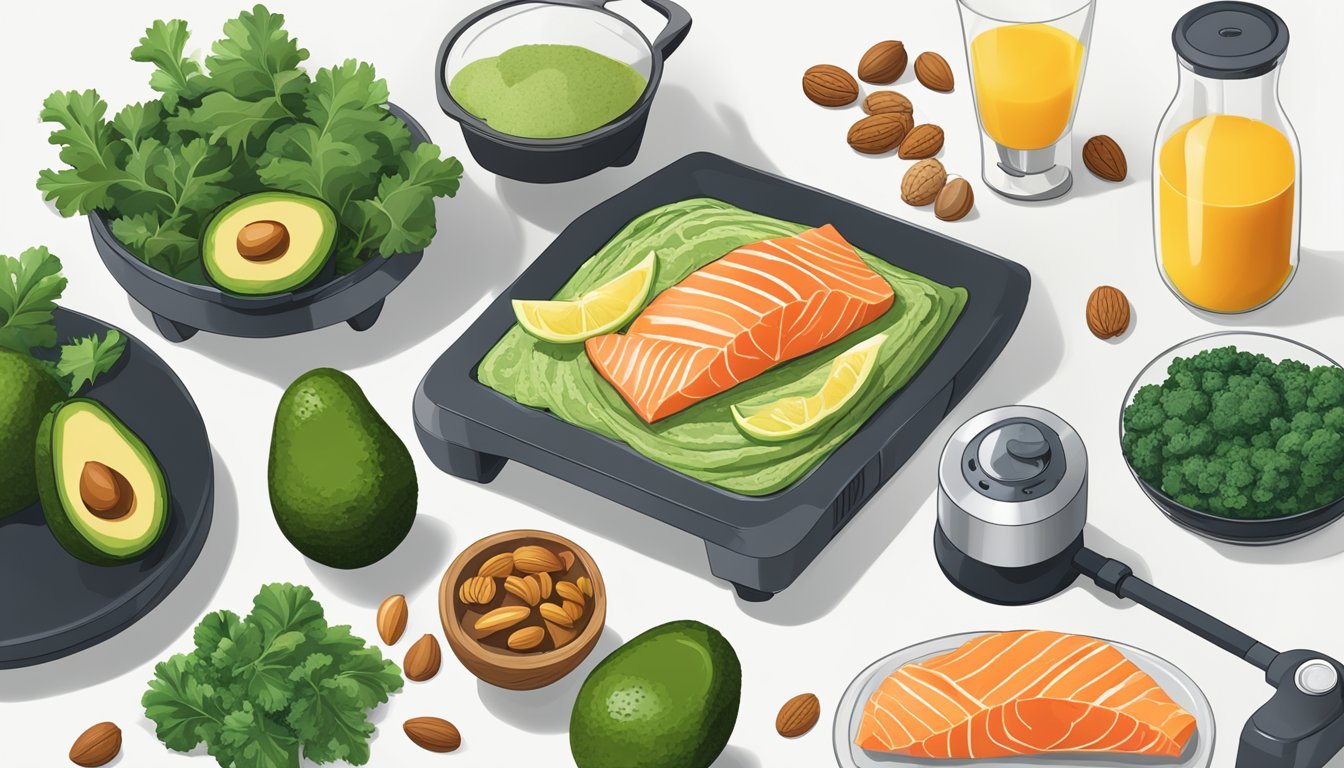Biohacking Food List
Essentials for Optimal Health & Performance
Discover > Biohacking > Biohacking Food List
Biohacking encompasses a broad spectrum of practices aimed at enhancing one's health and well-being by incorporating dietary changes, lifestyle adjustments, and technology. While it often delves into complex physiological processes, at its core, biohacking can be as straightforward as making informed decisions about the foods one chooses to eat. Fueled by a desire to optimize bodily functions and possibly delay the effects of aging, individuals are turning their attention to nutrient-dense foods that support their biohacking goals.
The foundation of biohacking through diet is selecting foods that offer rich supplies of essential micronutrients. Organ meats, for instance, have historically been valued for their dense concentration of vitamins and minerals. Similarly, small fatty fish, dark green leafy vegetables, and bivalves like oysters and mussels (What wine goes well with mussels?) come highly recommended for their abundance of nutrients that play critical roles in metabolic pathways. The inclusion of these foods in one's diet is believed to support various bodily systems, thus aligning with the biohacking community's pursuit of optimal health.
Eating healthy foods, biohack food lists are often tailored to provide specific physiological benefits, such as improved cognitive function or enhanced metabolic efficiency. Ingredients like aloe vera, chia seeds (how long do chia seeds last?), and fermented foods like sauerkraut (how long does sauerkraut last?) are said to support digestion, while certain fruits and grains are suggested for their antioxidant properties. Anyone interested in biohacking needs to approach dietary changes with a clear understanding of their individual health needs and goals, taking into consideration that optimal nutrition is an inherently personal endeavor.
Fundamentals of Biohack Food
Biohackers often seek to optimize their diet by focusing on highly nutritious foods that align with the human body. The essence of biohack food lies in tailoring one's diet to improve health, enhance well-being, and potentially even alter the expression of certain genes.
Key Components for a Biohacking Diet:
Micronutrient Density: For a diet to be effective in biohacking, it should be rich in whole foods with good vitamins and mineral content. Foods such as organs, small fish, dark green leafy vegetables, bivalves, and crustaceans are known to be dense in essential nutrients like zinc, folate, and vitamin A.
Digestion Support: Optimal digestion is fundamental to biohacking. Incorporating whole foods that aid in digestion can be beneficial. Probiotics, digestive enzymes, and fiber-rich foods support a healthy gut.
Quality Protein: Proteins form the building blocks of the body, affecting muscle health and hormone balance. High-quality protein sources should be incorporated, including beef, eggs, goat milk, and fish.
Personalization: A one-size-fits-all approach doesn't apply to biohacking. Good health is influenced by personal factors like individual genes and biology. Diets must be personalized to these unique factors for optimal effectiveness and to lose weight.
Biohackers should aim to eat real, unprocessed foods to minimize the intake of harmful substances while maximizing nutritional value. Regular monitoring of the body's responses to different foods can further refine this personalized approach to nutrition and diet.
Optimizing Diet for Health and Wellness
In the pursuit of enhanced health and wellness, individuals are turning to dietary optimization strategies. Careful selection of nutrient-rich foods and balancing macronutrients are core to mitigating inflammation and stress within the body.
The Role of Inflammation and Diet
Inflammation is the body's response to stress, whether from environmental factors, injury, or diet. Chronic inflammation can be addressed through eating foods that limit processed foods and incorporate anti-inflammatory food items. These include omega-3-rich fish, leafy greens, and foods high in antioxidants like berries, all foods likely to be lacking in processed foods.
Anti-inflammatory foods:
Omega-3 Fatty Acids: Salmon, flaxseeds (how long do flaxseeds last?), walnuts (how long do walnuts last?)
Antioxidant-Rich Items: Berries, dark chocolate, pecans (how long do pecans last?)
Importance of Nutrient-Dense Foods
With healthy eating habits nutrient-dense foods provide the body with a concentration of essential vitamins and minerals necessary for optimal functioning. These foods optimize health by improving nutrient intake per calorie consumed. They include:
Rich Sources of Nutrients:
Vitamins: Citrus fruits, peppers (Vitamin C); liver, carrots (Vitamin A)
Minerals: Nuts, seeds (Magnesium, Selenium); leafy vegetables (Iron, Calcium)
Fiber: Legumes, whole grains
Protein: Eggs, poultry, lean meats
Healthy Fats: Avocado, olive oil
Integrating a variety of these foods can lead to improvements in overall health and well-being.
Balancing Macronutrients
The balance of macronutrients—carbohydrates, fats, and proteins—is crucial for maintaining an optimized diet. Each plays a distinct role in health:
Proteins: Vital for tissue repair and immune function
Carbohydrates: Supply energy, with a focus on fiber-rich sources for digestive health
Fats: Necessary for hormone production and cellular health, with an emphasis to burn fat which minimizes unhealthy cholesterol levels
Most processed foods won't have the correct diversity of nutrients, so a transfer to an intake of unprocessed foods, where the macronutrients are in appropriate ratios, can support bodily functions and manage energy effectively.
Macronutrient balance example:
Carbohydrates: 45-65%
Proteins: 10-35%
Fats: 20-35%
Adhering to this approach to diet can lead to improved metabolic health, optimized energy levels, and the body produces a fortified immune system.
Biohacking Techniques and Dietary Practices
Biohacking through dietary practices leverages specific eating patterns and food choices to improve health and performance. The section explores well-regarded methods including intermittent fasting, the Bulletproof Diet, and the Elimination Diet.
Intermittent Fasting and Its Benefits
Intermittent fasting involves cycling between periods of eating and fasting, with typical patterns including 16/8 (16 hours of fasting followed by an 8-hour eating window) or 24-hour fasts twice a week. The benefits of intermittent fasting are supported by research showing potential in weight loss, improved metabolic health, and enhanced cognitive function.
16/8 Eating plan: Fasting for 16 hours a day typically includes the hours one sleeps, aiming to restrict the eating window to 8 hours.
5:2 Eating plan: Eating normally for 5 days of the week and restricting calories to about 500–600 on the other 2 days.
The Bulletproof Diet Overview
The Bulletproof Diet emphasizes foods high in fat, moderate in protein, and low in carbohydrates, with an overall aim to provide steadier energy levels and better brain activity. A notable component is Bulletproof Coffee, a blend of coffee, grass-fed butter, and MCT oil, believed to kickstart the day with high energy and good health.
Foods to Eat: Grass-fed meats, wild-caught fish, organic vegetables, and fats like coconut oil and avocados.
Foods to Avoid: Processed foods, grains, and sugars.
Supplements and Nutraceuticals
Biohackers often leverage supplements and nutraceuticals to support various aspects of their health and performance. Here's a focused look at some of the key substances that come into play.
Nootropics, also known as cognitive enhancers, are commonly utilized to boost mental performance. These may include natural substances like Bacopa Monnieri or synthetics aimed at enhancing memory, focus, and overall brain activity and function.
With gut health being paramount, probiotics are widely recommended. They help maintain a healthy gut flora, which is crucial for digestion and immune system function. Digestive enzymes, on the other hand, assist in the breakdown and absorption of nutrients from the food consumed.
Here are some essential supplements and their attributed benefits:
Supplement Potential Benefit Vitamin B12 Supports energy levels and brain health Magnesium is Involved in muscle and nerve function Probiotics Promote a healthy digestive system Digestive Enzymes aid in the proper digestion of food
The inclusion of vitamin B12 is significant for those on plant-based diets or individuals at risk of deficiency due to various health conditions. This vitamin is crucial for nerve tissue health, brain function, and the production of red blood cells.
Magnesium plays a vital role in several bodily processes, including regulating muscle and nerve function, blood sugar levels, and blood pressure, as well as making protein, bone, and DNA.
Harnessing the Power of Superfoods
Superfoods pack a potent concentration of nutrients, providing an array of health benefits that support optimal well-being. Integrating these nutrient powerhouses into one's diet presents opportunities for enhancing energy levels, bolstering immunity, and promoting overall health.
Incorporating Healthy Fats and Proteins
Consuming healthy fats and proteins is crucial in a diet optimized for vitality and longevity. Superfoods rich in omega-3 fatty acids—like small fish such as mackerel and sardines (how long do sardines last?)—offer anti-inflammatory benefits and support cognitive function. Grass-fed meats provide a higher proportion of omega-3s compared to their grain-fed counterparts, making them an excellent protein source. Additionally, pastured eggs are a powerhouse of essential amino acids and healthy fats vital for cell membrane integrity and hormonal balance.
Healthy Fats and Proteins Superfood List:
Small Fish (Mackerel, Sardines)
Grass-fed meats (Beef, Lamb, Mutton)
Pastured Eggs
Seeds (Chia, Flaxseed)
The Significance of Antioxidants and Phytonutrients
The role of antioxidants and phytonutrients sourced from superfoods cannot be understated. These compounds scavenge harmful free radicals, reducing oxidative stress and the risk of chronic diseases. Shrimp and other crustaceans, apart from being lean protein sources, are laden with astaxanthin, a potent antioxidant. Similarly, dark green leafy vegetables are high in antioxidants, including vitamins C and E, and are replete with phytonutrients like carotenoids, which are known for their vision-protecting properties.
Antioxidants and Phytonutrients Rich Superfoods:
Dark Green Leafy Vegetables (Spinach, Kale)
Berries (Blueberries, Strawberries)
Shrimp and Crustaceans
Seeds (Chia, Flaxseed)
Biohacking Hydration
Proper hydration is fundamental in the realm of biohacking. It's not merely about drinking water but ensuring that water molecules function optimally within the body. One's hydration status can profoundly influence cellular homeostasis, facilitating the transport and delivery of nutrients, as well as the elimination of waste products. Maintaining adequate hydration is essential for an individual's daily functions, such as keeping body temperature regulated and lubricating joints, tissues, and organs.
An integral component of hydration lies within electrolytes like sodium, potassium, magnesium, and calcium. These charged minerals are crucial for the conduction of nerve impulses, the contraction of muscles, and the balance of fluids in and out of cells and tissues.
Here's a quick guide to maintaining optimal hydration:
Daily Water Intake: It generally varies depending on the individual’s size, activity level, and environment, but a good starting point is to consume at least half of one's body weight in ounces of water per day.
Add Electrolytes: Consume a balanced electrolyte supplement or include natural sources like coconut water or a pinch of Himalayan pink salt (how long does himalayan pink salt last?) in your water to replenish electrolytes.
Foods with High Water Content: Incorporate hydrating foods into your diet such as cucumbers, celery, watermelon, and berries.
Monitor Urine Color: Aim for a light straw color as a sign of proper hydration.
Avoid Dehydrants: Minimize intake of caffeine and alcohol, which can disrupt the absorption of water and lead to dehydration.
Enhancing Mental and Physical Performance
In the realm of biohacking, specific foods and exercises are purposed to bolster mental acuity and physical prowess. They tap into the body's potential, aiming to improve focus, enhance cognition, and maximize athletic performance with a science-backed approach.
Nootropics for Cognitive Enhancement
Nootropics, often referred to as "smart drugs," are substances that can potentially improve brain function, memory, and cognition. They are favored for their ability to enhance mental health and mood. Here is a list of commonly recognized nootropics:
Omega-3 Fatty Acids: Found in fatty fish such as salmon and sardines, these fats are crucial for maintaining brain health.
Vitamins B12 and Folate: Essential for cognitive function and found in foods like beef, eggs, and leafy greens.
Lifestyle Biohacks That Complement Food Choices
The foods one consumes are only a part of the equation for optimal health; lifestyle choices around sleep, exercise, and stress management play pivotal roles in the effectiveness of a biohacking diet.
The Impact of Sleep on Diet
Adequate sleep is foundational for one's dietary choices to be most beneficial. Research indicates that individuals with consistent and restful sleep patterns tend to make healthier food selections and maintain better portion control. Sleep deprivation, on the other hand, can disrupt hormones like ghrelin and leptin that regulate appetite.
Exercise as a Biohacking Tool
Exercise is a powerful ally in biohacking one's diet for improved productivity and mental health. Engaging in regular physical activity can boost metabolic function and enhance the absorption of nutrients from food. Different forms of exercise, whether it's strength training, cardiovascular workouts, or flexibility routines, should be integrated to complement dietary choices.
Stress, Meditation, and Nutrition
The relationship between stress, meditation, and nutrition is a critical triad in the biohacking community. Managing stress through mindfulness and meditation practices can lead to better digestion and assimilation of food.
Emerging Trends in Biohacking Diet
Biohacking diet trends are rapidly evolving with advancements in biotechnology and science. They focus on using nutrigenomics and wearable technology to tailor dietary choices for optimal health and performance.
Nutrigenomics and Personalized Nutrition
Nutrigenomics is an innovative field intersecting nutrition and genomic science. It examines how foods affect one's genes and how individual genetic variations can affect nutritional needs. Personalized nutrition aims to create highly individualized eating plans based on a person's DNA profile. Research in this area suggests that understanding genetics can lead to better dietary choices that prevent disease, enhance health and promote weight loss.
Key components in nutrigenomics include:
Mini peptides: These are small peptides that assist in balancing organ systems without the need for injection, showing promise in recent research.
Micronutrients: The focus is on foods rich in folate, vitamin A, calcium, and vitamin B12, such as:
Organs
Small fish
Dark green leafy vegetables
Bivalves
Eggs
The Future of Wearable Technology in Diet Tracking
Wearable technology is becoming increasingly valuable for real-time diet tracking and management. These devices are used for monitoring biological markers such as blood sugar levels and metabolic rate, to help inform dietary decisions. Wearable tech integrates seamlessly into a person's life and provides data to make more informed choices about food intake, portion sizes, and timing of meals.
Conclusion
In the pursuit of enhanced well-being, individuals incorporate a variety of nutrient-dense foods into their diet. Biohackers also embrace healthy fats, as seen with the inclusion of coconut oil, recognized for both its energy-boosting and cognitive function benefits. Sustainable sources of protein are emphasized, in addition to foods that fortify gut health, such as fermented products. The approach is methodical, with a focus on natural food sources to provide the body with the tools it needs for optimal functioning.
The practical application of these dietary choices demonstrates the commitment to a lifestyle that values nutrition as a fundamental component for enhancing quality of life. As biohacking continues to evolve, individuals tailor their diets according to personal health metrics, embracing a proactive relationship with their well-being.





